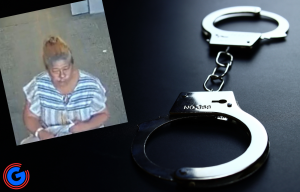A 22-year old woman charged with the felony murder of her 14-month old daughter in 2012 will appear in court next month in Rutherford County.
In November of 2012 Murfreesboro Police responded to an apartment on Mercury Boulevard in regards to an unresponsive toddler. After the child was taken to the local hospital, officers met with LaKeenta Henry, the mother of the child.
While in the Emergency Room, the Department of Children Services asked Henry to submit to a urine toxicology test by providing a urine sample. When Henry exited the restroom she was questioned as to how she went about obtaining her urine after authorities became suspicious when she handed them a cup that was cool to the touch. When questioned, the report shows, “she told Detective Knox that she had dipped the cup in the toilet.” Later in the day a real urine sample was gathered and it tested positive for the use of cocaine, benzos and marijuana. A blood test was also conducted and the results of that were sent to the Tennessee Bureau of Investigations. A number of days later the investigating officer wrote, “I felt the baby died because of actions by the mother, LaKeenta Henry.”
Henry is scheduled to appear in Circuit Court to file a plea on June 25th. She is facing charges of not only felony murder, but also aggravated child endangerment and aggravated child neglect. She is being held in the Rutherford County Adult Detention Center and has not made bond. She will be represented in court by a public defender.
A second child that lived with Henry is now in the care of the state.
Source:
Rutherford County Sheriff’s Office
Murfreesboro Police Arrest Report: #12-22513
TCA Code 39-13-202, 39-15-402
Rutherford County Circut Court Docket
39-13-202. First degree murder.
(a) First degree murder is:
(1) A premeditated and intentional killing of another;
(2) A killing of another committed in the perpetration of or attempt to perpetrate any first degree murder, act of terrorism, arson, rape, robbery, burglary, theft, kidnapping, aggravated child abuse, aggravated child neglect, rape of a child, aggravated rape of a child or aircraft piracy; or
(3) A killing of another committed as the result of the unlawful throwing, placing or discharging of a destructive device or bomb.
(b) No culpable mental state is required for conviction under subdivision (a)(2) or (a)(3), except the intent to commit the enumerated offenses or acts in those subdivisions.
(c) A person convicted of first degree murder shall be punished by:
(1) Death;
(2) Imprisonment for life without possibility of parole; or
(3) Imprisonment for life.
(d) As used in subdivision (a)(1), "premeditation" is an act done after the exercise of reflection and judgment. "Premeditation" means that the intent to kill must have been formed prior to the act itself. It is not necessary that the purpose to kill pre-exist in the mind of the accused for any definite period of time. The mental state of the accused at the time the accused allegedly decided to kill must be carefully considered in order to determine whether the accused was sufficiently free from excitement and passion as to be capable of premeditation.
HISTORY: Acts 1989, ch. 591, § 1; 1990, ch. 1030, § 15; 1991, ch. 377, § 2; 1993, ch. 338, § 1; 1993, ch. 473, § 1; 1994, ch. 883, § 1; 1995, ch. 460, § 1; 1998, ch. 1040, § 3; 2002, ch. 849, § 2a; 2007, ch. 158, § 2.
39-15-402. Haley's Law -- Aggravated child abuse and aggravated child neglect or endangerment -- Definitions.
(a) A person commits the offense of aggravated child abuse, aggravated child neglect or aggravated child endangerment, who commits child abuse, as defined in § 39-15-401(a); child neglect, as defined in § 39-15-401(b); or child endangerment, as defined in § 39-15-401(c) and:
(1) The act of abuse, neglect or endangerment results in serious bodily injury to the child;
(2) A deadly weapon, dangerous instrumentality, controlled substance or controlled substance analogue is used to accomplish the act of abuse, neglect or endangerment;
(3) The act of abuse, neglect or endangerment was especially heinous, atrocious or cruel, or involved the infliction of torture to the victim; or
(4) The act of abuse, neglect or endangerment results from the knowing exposure of a child to the initiation of a process intended to result in the manufacture of methamphetamine as described in § 39-17-435.
(b) A violation of this section is a Class B felony; provided, however, that, if the abused, neglected or endangered child is eight (8) years of age or less, or is vulnerable because the victim is mentally defective, mentally incapacitated or suffers from a physical disability, the penalty is a Class A felony.
(c) Nothing in this part shall be construed to mean a child is abused, neglected, or endangered, or abused, neglected or endangered in an aggravated manner, for the sole reason the child is being provided treatment by spiritual means through prayer alone, in accordance with the tenets or practices of a recognized church or religious denomination by a duly accredited practitioner of the recognized church or religious denomination, in lieu of medical or surgical treatment.
(d) "Serious bodily injury to the child" includes, but is not limited to, second- or third-degree burns, a fracture of any bone, a concussion, subdural or subarachnoid bleeding, retinal hemorrhage, cerebral edema, brain contusion, injuries to the skin that involve severe bruising or the likelihood of permanent or protracted disfigurement, including those sustained by whipping children with objects.
(e) A "dangerous instrumentality" is any item that, in the manner of its use or intended use as applied to a child, is capable of producing serious bodily injury to a child, as serious bodily injury to a child is defined in this section.
(f) This section shall be known and may be cited as "Haley's Law".
(g) The court may, in addition to any other punishment otherwise authorized by law, order a person convicted of aggravated child abuse to refrain from having any contact with the victim of the offense, including, but not limited to, attempted contact through Internet services or social networking web sites; provided, that the person has no parental rights to such victim at the time of the court's order.
HISTORY: Acts 1989, ch. 591, § 1; 1994, ch. 978, §§ 2, 8; 1996, ch. 1069, § 1; 1998, ch. 1040, § 1; 2005, ch. 487, § 2; 2009, ch. 88, § 1; 2009, ch. 89, § 1; 2009, ch. 418, § 2; 2011, ch. 292, §§ 5-7; 2011, ch. 313, § 2; 2012, ch. 848, § 14.













